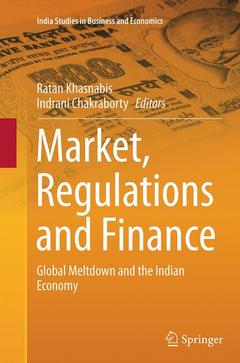Description
Market, Regulations and Finance, Softcover reprint of the original 1st ed. 2014
Global Meltdown and the Indian Economy
India Studies in Business and Economics Series
Language: English
Subjects for Market, Regulations and Finance:
Publication date: 09-2016
Support: Print on demand
Publication date: 04-2014
253 p. · 15.5x23.5 cm · Hardback
Description
/li>Contents
/li>Biography
/li>Comment
/li>
Ratan Khasnabis has recently retired as Professor at the Department of Business Management, Calcutta University; however, he still remains associated with the Department as the Director of the Masters in Human Resource and Organisational Management (MHROM) Programme. Dr Khasnabis is also the Honorary Visiting Fellow of the Institute Of Development Studies, Kolkata and Institute of Human Development, Delhi. He has published a large number of papers, including Economy and Market: Fredric Hayek Revisited, Political Economy of Reforms in China and Paul Sweezy and the Theory of Economic Stagnation. Together with Prof Amiya Kumar Bagchi, he has edited the book Economy & the Quality of Life: Essays in Honour of Ashok Rudra.
Indrani Chakraborty is currently Professor of Economics at the Institute of Development Studies Kolkata. She was formerly at the Centre for Development Studies, Trivandrum and North-Bengal University, West Bengal. She has published a large number of articles in reputed journals and as book chapters on the impact of capital inflows, the role of financial development on economic growth, capital structure of corporate firms, and impact of reforms on firms' performance.



